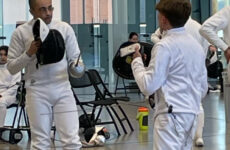
Brody Nicolaisen
On Wednesday Nov. 6 I attend the volunteer tutoring training session for the Adult Literacy Center at the DMACC Urban Campus. I was surprised to find that I was one of only five in attendance. I was even more surprised to find that I was the only DMACC student present.
Tutoring isn’t for everyone; it requires patience with the students’ progress and the ability to set aside time in your own schedule. However, for anyone able and willing, you should strongly consider joining.
The ability to read is something most people take for granted; however, in the state of Iowa alone, there are more than 50,000 people who don’t have this privilege. Asking for help can be a truly humbling process due to the negative stigmas that surround illiteracy. Despite this, many have found the courage to seek assistance. Students want to improve, and by becoming a tutor you can ensure that improvement does happen.
The Adult Literacy Center has more than 180 students on its current roster, but only 59 tutors. With the number of students continuing to increase, a lack of tutors is becoming more of an issue each day.
The average age of a student is 35 years, however a student’s age can vary from young to old. Most tutor-student pairings are done in small groups of two or three, as to ensure neither side becomes overwhelmed.
Teaching another person how to read can sound difficult, but the Mindplay online training module helps make things much simpler. All that’s required of the tutor is to check on their student’s progress and to help them work through their reading assignments during each visit.
Each meeting is determined by both the tutor and the student, in order to find a time and location that works well for both sides. Oftentimes, the teaching lessons amount to meeting once or twice a week for a period of two to three hours.
Vickier Merrifield, a literacy teacher at the DMACC Urban Campus, says,“The total amount of time spent in the program is 2-3 years. However, this often feels shorter than what it is as many tutors and students become friends as they work together and their tutoring sessions become more like reading and visiting times, or do things together.” For those interested in volunteering, contact Vickie at vlmerrifield@dmacc.edu.
Tutoring isn’t for everyone; it requires patience with the students’ progress and the ability to set aside time in your own schedule. However, for anyone able and willing, you should strongly consider joining.
Like any volunteer position, becoming a tutor requires a certain amount of self-sacrifice on your own part. However, the benefits of doing so can be deeply rewarding. This is a journey I look forward to taking and I hope you do as well.





Comments